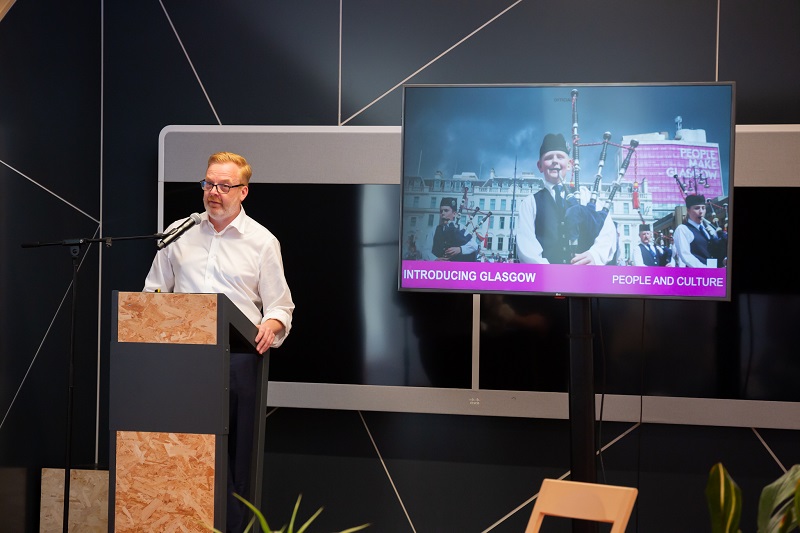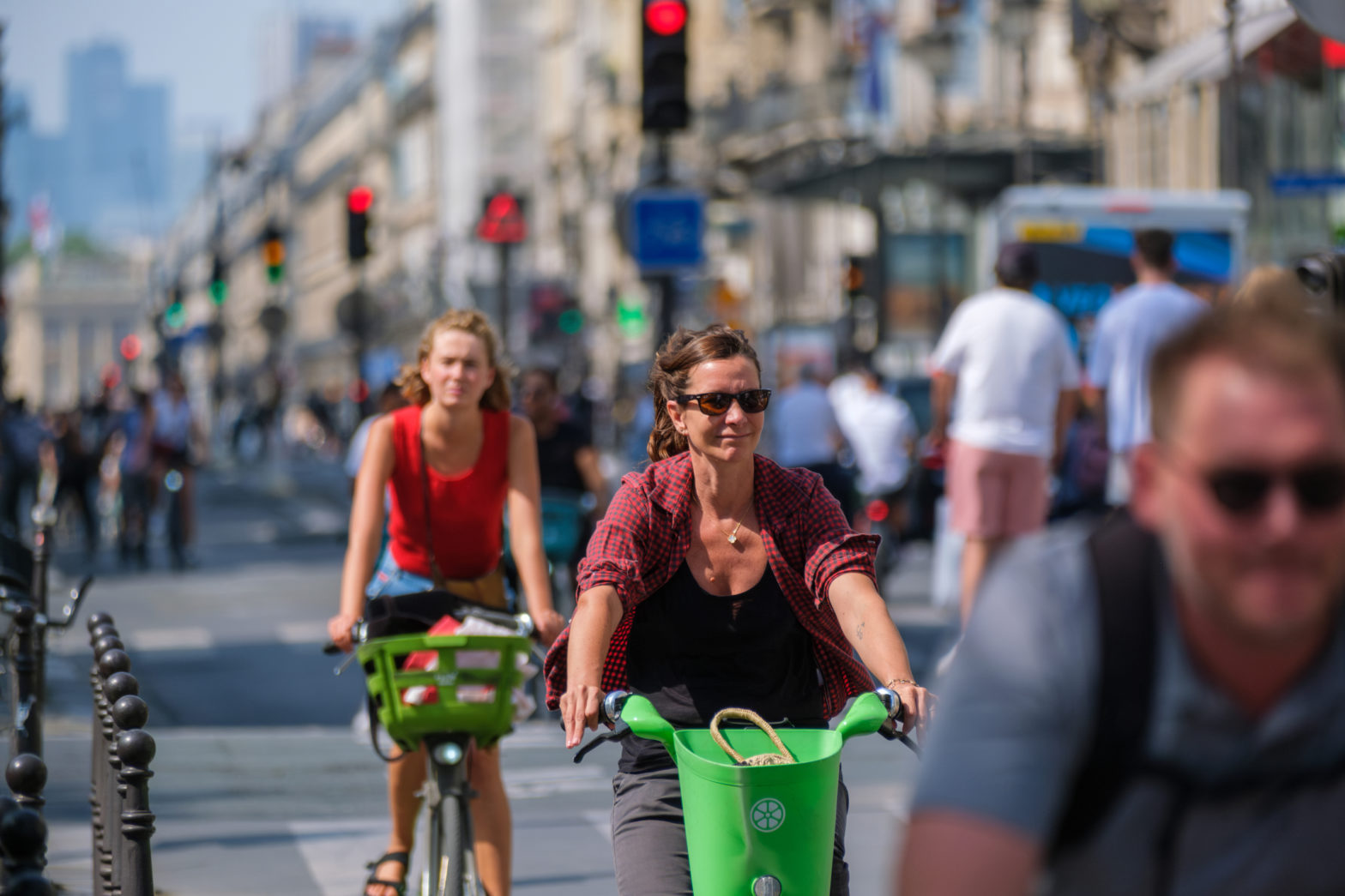
Photo: Cities Today
Glasgow’s new digital strategy to focus on digital rights
28 June 2023
by Sarah Wray
A decade into its smart city journey, Glasgow is working on a new digital strategy. Chief Digital Officer Colin Birchenall reflects on how thinking has evolved over this time.
Glasgow boasts many impressive technology achievements and assets, including a ‘smart canal’, smart campus, and streets that demonstrate advanced energy systems. All the streetlights in the centre are now intelligent and the city is home to Scotland’s first innovation district.
The Scottish city was an early adopter of open data and data analytics and has developed a 3D model to support urban planning decisions.
But behind the sensors and technology is an approach to digital innovation that has significantly matured, says Glasgow’s Chief Digital Officer, Colin Birchenall.
As Glasgow nears the conclusion of its second digital strategy, launched in 2018, and develops plans for the next phase, Birchenall told Cities Today that the focus will increasingly be on digital rights and ensuring that innovation is sustainable.
He was speaking during an interview at the Cities Today Institute City Leadership Forum in Glasgow last month.
Ten years on
All the way back in 2013, Glasgow was awarded £24 million (US$30 million) from Innovate UK to become a ‘future city demonstrator’ through the use of digital infrastructure and data. This acted as a catalyst and laid important foundations for the city. A 2017 impact evaluation report found that the funding had delivered a £144 million return on investment. It also provided an opportunity to learn through real projects.
“Back then, I don’t think anybody knew what smart cities were,” says Birchenall. “We were testing it and trying to work it out ourselves.”
The emphasis was largely on using the latest technology, and gathering and publishing data, but “it lacked context”.
The 2018 strategy evolved from this early thinking to become more holistic and incorporate the economy, inclusion, skills and connectivity, as well as the transformation of public services.
Birchenall highlights several successes from this, such as the growth and diversity of the city’s technology sector. He is proud of the Connected Learning Programme, which has provided over 60,000 iPads to school children and is credited with building new digital competencies and creativity in young people.
The city was one of the first in the UK to launch a dedicated Telecoms Unit to act as a single point of entry and information for industry partners. The approach has inspired other cities such as Dublin.
“We recognised that to support the investments needed in the city and connectivity, we needed to change how we engage with the telecommunications sector,” comments Birchenall. “The Telecoms Unit has become a blueprint model for other cities to replicate as well.
“The level of infrastructure that’s been put into the city on the back of that has been fabulous.”
Purpose-driven data
The city’s use of data has developed to address strategic priorities such as economic growth, improving public spaces, and encouraging active travel. Working with the University of Glasgow, the data team deployed object detection technology in the existing CCTV system to count people and street traffic and gather insights into the impact of interventions on footfall, dwell time and walking/cycling.
One notable data project has enabled the city to better understand needs around child poverty to target support such as vouchers. The city is moving towards a system where people receive help that they’re entitled to automatically without needing to fill in forms.
“This could actually cost the council money because we’ll be distributing more grants but that’s what they’re for – better outcomes and to help those families,” Birchenall says. “Tackling poverty is a huge challenge in the city so the more we can do that, the better.”
Another project in collaboration with partners including the police is using data to understand the likely patterns associated with alcohol and drug deaths.
“What we’d like to get to is a predictive model so we can identify when somebody could be at risk of alcohol and drug death, as part of the early intervention agenda,” says Birchenall.
“In smart city projects, we tend to think about the technologies, the sensors and the Internet of Things. For me, it’s about the data and how data can improve the lives and livelihoods of the people in Glasgow.”
Looking ahead
The forthcoming digital strategy, due towards the end of the year, will build on the successes and learning over the last decade.
“In the last strategy we talked about what we were going to deliver and it’s always looked like a bit of a shopping list of projects,” comments Birchenall. “We’ve delivered most of that, which is great, and that has had a massive impact. People refer to the strategy and how it’s helping to drive things, but there are still some basics that we haven’t really got in place.
“The aim of this [next] strategy is to think more about how to create a sustainable model to continuously drive digital transformation.”
While the city has attracted significant innovation funding, scaled up infrastructure such as the intelligent streetlights, and seen its innovation district spur three others across the city-region, Birchenall sees greater potential.
For example, the city still has “quite a traditional way of delivering projects” and sometimes struggles to find capacity to innovate, drive new collaborations, and experiment with ideas to bring back to the council.
“I want to create more space for that type of work and the strategy will help bring all that together,” he says.
Inspired by cities such as Amsterdam and Barcelona and through Glasgow’s involvement in the Cities Coalition for Digital Rights, the next strategy will also include a digital society strand.
Previously, principles such as privacy, trust, security and inclusion were dispersed across the plan.
“What we want to do is bring it all together, so we can tell the story better and also engage around digital rights,” says Birchenall.
The city will establish ‘core values’ for digital projects. These will be co-developed with councillors, and with residents through the city’s online community engagement platform.
“The focus is shifting to become more user-centric and understanding user needs,” says Birchenall.
With an assumption that the technology opportunity is “almost infinite”, this approach will guide the city’s adoption based on delivering better outcomes and making services more targeted, holistic and preventative.
“If you want to make those changes, it requires a complete shift in mindset within council, and how you engage with the public as well. It’s not like traditional programmes where you’re just making processes more efficient; this is about re-imagining how you deliver services,” says Birchenall.
“That’s where you start, rather than with technology.”






